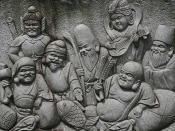Humans in their nature, hypothesize and at the same time are skeptical of everything they believe. Every human belief has the predisposition of being doubted at some point in time. Even God, in all His wisdom has been doubted. Humans are a marvelous creation, but have many imperfections. If God is so powerful, why are we flawed? Is God flawed as well? This is one of the skeptical arguments against the existence of God. Rene Descartes pushes skepticism to its fullest extent in order to assert his own beliefs. This is achieved through doubting anything which is true in our external world. External perceptions are brought into play here . In widening the spectrum of doubt, Descartes is able to create his own argument for overcoming his own skeptical challenge. This is a process in which Descartes discovers the ideas which he is unable to doubt. Descartes goes on to explain that all knowledge is discovered because of sensory input, besides the knowledge of God.
Hence, our ideas of God are innate. We know for certain this knowledge must have been hardwired by another being. This ontological argument is required here because questioning God's intentions is necessary for addressing Descartes skeptical arguments. The skeptical challenge is addressed by questioning if God actually exists. God's existence can further be examined through the questioning of man's existence.
The skeptical challenge refers to the unreliability of the external world for true perception. We know that the mind can misinterpret the external world from time to time. Therefore, one must wonder how often he or she misinterprets sensory input. If perceptions are sometimes false, where can one draw the line? Descartes skeptical arguments include "Dream hypothesis" and the "Evil Demon Hypothesis," (Descartes, 4-5) The dream argument shows that our perceptions of the...


